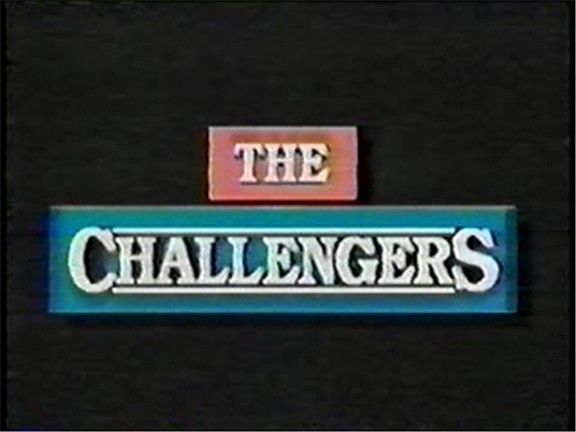Today is November 3. This is our champion... and these are...
 SHOW:
THE CHALLENGERS SHOW:
THE CHALLENGERS
AIR DATES: September 3, 1990 to August 30, 1991
CREATOR: Ron Greenberg Productions (The Big Showdown)/Dick Clark
Productions
HOST: Dick Clark
WATCH IT AT: youtu.be/sCbknQ5g_b4
It's no secret that game shows are often recorded weeks - or
even months - in advance. So having topics that are actually, well,
topical is not really in the cards. But when Ron Greenberg decided to
revive his "Who, What or Where Game" from the late 60s and
early-to-mid-70s, he decided to go a different route; by taping a week's
worth of shows on the Friday BEFORE the shows aired, more current events
could be used in the questions. And having Disney's Buena Vista
Television distribute it and bringing Dick Clark out of semi-retirement
after his stint in "Pyramid"...well, that was just a bonus coup there.
Shame it was cut off after a year...though it truly WAS a year, not nine
months followed by reruns!
HOW WAS IT PLAYED?
MAIN GAMEPLAY
Three contestants (one champion and two titular "Challengers") play.
There are four rounds in each game.
CHALLENGERS SPRINT ROUND
Each contestant starts with $200. During most of the run, the host
gives 60 seconds worth of rapid-fire buzz-in questions, worth $100 if
right and COSTING $100 if wrong. At the end of the round, the one who
has the most money gets to choose the first category in Round 1. This
was replaced, quite briefly, by a SINGLE toss-up question for $100
ROUND 1
Six categories are present and the "chooser" picks one of them.
Sometimes, the categories are more topical, like "This Week On TV" or
"Today At The Movies". Each category has three questions of increasing
difficulty and value. The easiest is valued at $150 ($100 in later
months), the next more difficult one at $200 ($150) and the MOST
difficult at $250 ($200). The three contestants then secretly choose
which question they want to answer. If all three choose different
questions, they each get their quest asked of them for +/- the value (no
answer equals wrong answer in this case). If two choose the same
question, the two are asked a toss-up for +/- the value.
If all THREE choose the SAME question, all values of the questions get
doubled. If one answers the toss-up correctly, that contestant not only
gets the doubled value but gets to decide whether or not to try the
OTHER questions (one at a time) themselves for +/- the doubled value.
They can quit at any time but a wrong answer ends that category.
The
one who answers the highest-valued question gets to choose the next one
in the round (if no one answered correctly, the one who picked the last
one picks again). The round continues until time runs out or all six
categories have been played.
ROUND 2
This round is played exactly like Round 1, save the values have all
doubled from the previous round. Again, the round ends when time expires
or all six categories have been played. At the end of the round, any
contestant with $0 or a negative score are eliminated from the game.
FINAL CHALLENGE
Similar to "Final Jeopardy!", the contestants must wager some amount of
their earnings, The host shows the category and the three questions. The
easiest question is worth even odds for a right answer (A $500 wager
earns $500 for a right answer, though they lose $500 for a wrong
answer), the next hardest question offers DOUBLE the odds ($1000 for a
$500 wager) and the HARDEST offers TRIPLE odds ($1500 for a $500 wager).
The host says "The Challenge is yours", and the contestants have 15
seconds to lock in a wager and a choice of question. If only one
contestant chooses a question, they are asked the question themselves.
If more than one chooses the same question, the one who wagers the most
is the ONLY one who gets to answer it.
Whoever has the most money after the Final Challenge is the champion.
All three contestants got to keep the money they earned in the game via
Citibank credit cards (though they had the option to take cash instead).
BONUS ROUND (ULTIMATE CHALLENGE)
This round had two formats. The first had the champion having to win
three games in a row to go for an incrementing jackpot. They were given
a choice between two categories and the host asked increasingly
difficult questions based on the category picked. After five seconds to
think of an answer, they must give said answer. If they answer wrong,
the round is over. If they're right, they move to the next question.
Answering all three questions right nets the champion the jackpot.
After a while with few winners, the format was changed to a simple daily
shot at $10,000. The champion was given the category and the question
(which usually had a multi-part answer). After five seconds to think,
the champions gives their answer(s). If they're right, they get the
$10,000. In any case, the champion returned the next day. Around
February or March of 1991, the Ultimate Challenge was removed entirely.
WHAT WORKED?
Of course, seeing more recent topics in a game show is a novelty in its
own right. Questions about the week's TV programs or new movie
releases...or even recent news stories (all verified by Newsweek
magazine, as the on-air plugs note) was the true sticking point for this
show. And seeing the day's date announced at the start of the show made
people tune-in to see what stuff they came up with. Hell, I'm sure some
(like me) were tricked into thinking the show was taped THAT MORNING for
a while.
Dick Clark was...well, he was Dick Clark, the consummate TV host. The
many, many years on "American Bandstand", "The $***,000 Pyramid" and
"TV's Bloopers & Practical Jokes" served "America's Oldest Living
Teenager" very well. He was humorous when he could be, but he basically
channeled Alex Trebek (which isn't a BAD thing, really). He had
knowledge of the game like he had studied it for months in advance and
kept the game moving at a brisk pace. Even when the rules seemed to
change monthly, he rolled with it like a true professional.
It was almost obvious from the get-go that this was a "Jeopardy!"
rip-off (two rounds of six categories, wagering in final round, "FINAL"
in final round's name). Of course, seeing as how J! had just finished
it's "Super Jeopardy!" tournament on prime-time, is it any WONDER they
wanted in on it? The format was JUST different enough to keep it from
out-and-out plagiarism, though. And, as stated, the more topical
questions helped immensely.
WHAT DIDN'T WORK?
For one, the music leading in
and out of segments was relatively uninspiring. Seems almost like the
hit a Casio keyboard "DEMO" button to get the tune and then jazzed up
ever so slightly. I know they were trying NOT to be J! but...the
laid-back feel of the music might've helped TOO much.
The MAJOR problem was, of course, that the rules changed almost every
other week. I've said it before that consistency is NOT the hobgoblin of
game shows. You think J! has been around for four decades because of
Trebek? Well,...maybe, but it's ALSO stayed around because everyone
knows the game, is comfortable with it and likes it. If you change one
round or another every few months, you'll lose the audience...and that's
exactly what happened.
Oh, and having a "Tournament of Champions" two months into your entire
run is KINDA lame. Can you say "lack of confidence in your own show"? At
least the show gave J! the idea for a "Teacher's Tournament";
"Challengers" had one in their run.
WOULD IT WORK TODAY?
Well, SURE, it would. As long as the rules stayed consistent, I see no
reason why a show can't be done this way. Only thing that could be
better is if it was LIVE. I know that's been tried but...why not? Only
one problem, though; a current-events-focused game show...would PROBABLY
only be liked by CNN...and I turned OFF that "game show" with Anderson
Cooper hosting some years ago so...
NEXT TIME: Seriously,
your Honor, this show wasn't a mistake...
For now, Chris Wolvie...so long! E-mail him at chriswolvie@yahoo.com.
|


